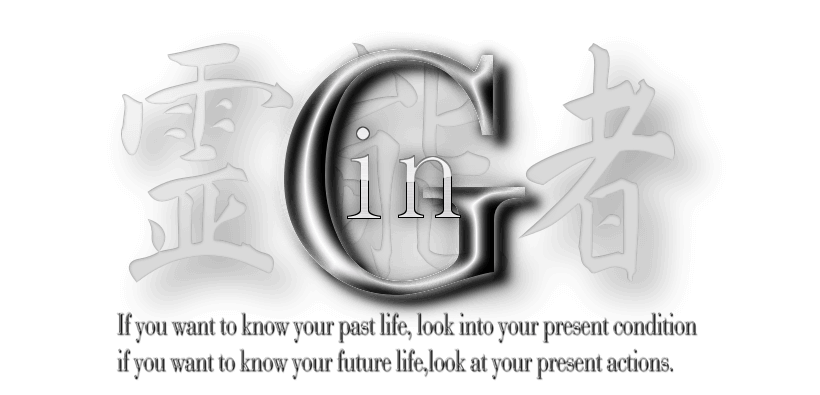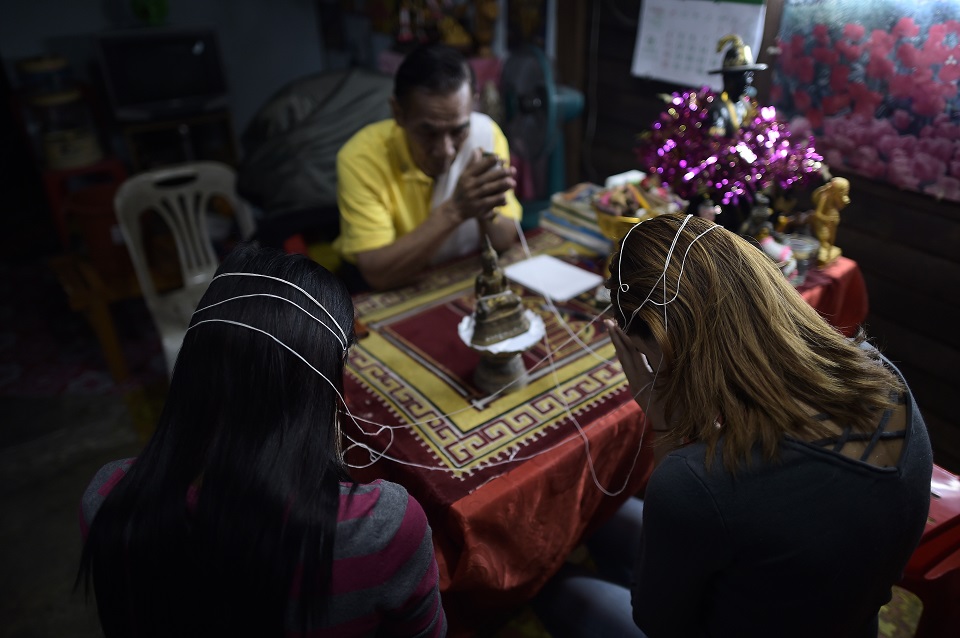タイの占い フランス通信社(APF)の見解 GINの見解

Contents (目次)
フランスAPF通信社が書いた記事
記事を解釈しやすいように訳してみる
APF(Agence France-Presse)より抜粋の記事
記事本文は以下
Thailand: Land of smiles, land of ghosts
原文の直訳じゃありません。 理解しやすいようにデフォしてます、所謂意訳です。しかしながら主文からはズレていませんのであしからず。 以下 GINの解釈の訳(意訳)です。※青字
精神世界の悪より身を守るため、仏僧の主張や悪魔祓い(お守り的な意味)他 またそうしたものからの脅迫観念への対策や 昔ながらの迷信 などを信仰し 信じる傾向がタイにはある。 全ての国の人々は死後の世界を信じている様で ただそこに西洋と東南アジアでの違いがはっきりとあり 西洋ではサタン 東洋では幽霊 であり悪事をした際のその罪は それらによって追求される と考えている。
民族信仰も深く 仏教という大きな枠組みだけでは理解できない。 またそれらを身近に感じており スピリットハウスの様に それらへ供え物をし 霊をなだめられると考えている。 これらの信仰は生活にも密着していて 他政治にも影響を及ぼす場合もあるほどである。 必ずしも正しい方向へ導くものではなくて 悪事をあたかも正しいかのような方向へ導くこともある。 また 迷信を信仰することで本当の問題が見えなくなっているとも感じる。 悪いことが起きる 不幸がある と悪霊に憑いている 幽霊(精霊)が怒っているなどという理由に転化され またそれらを避ける為のお守りとして彫刻やお守り(プラクルアン) タトゥー(サクヤン)などを所有・施しし 価値=効果 として崇拝している。
例に例えるならば交通事故などが良い例でわかりやすい。 本来 具体的処置(安全運転 教育 法律)をするべき事も こうした崇拝事で片付けてしまう。 事故を起こしたとして そのことに関して問題視すべきは お守りがあるから大丈夫と過信し 酒を飲んでも大丈夫 薬を飲んでも大丈夫 という自分本位な解釈が定着している事である。 またそれを肯定するかの様に 占い師 占星術師 また大きく資金のある寺などがお祓いや儀式などを行い 気分が優れた という雰囲気を持たせて効果を演出している。 ある種の迷信の通りに仕向けることが問題である。 つまりタイでの占い師 占星術師 有名な僧侶は 市民に既に定着した迷信を市民が信じている状況 という状況もあって有利なのである。
こうした風潮から 特定者が使用したり また想定できる範囲の儀式方法や呪文(サクヤン=タトゥー他)や用具 お守りは高値で取引され 僧侶が潤う仕組みである。 タイでは不慮の死を遂げたものは魂が残り現世に生き続ける という考えが一般であり成仏・浄化されずに残ると考えられている。
例として ワット メー・ナークの言い伝えである。
※ 私も話題にしたものです。
ワット・ナーンナーク の話
GINのアメブロ記事
本来のストーリーは愛情や憎悪の話であったはずなのに いつの間にかその愛情や憎悪の話は薄れてしまい宝くじ発表の前夜は一晩中入場でき 人が行きかい 供え物をすることができるというお寺の対応も然り また当選するという迷信を作り上げ 今はその寺を支えているのも事実。 またお寺の敷地内にある販売所では五戒への懺悔という意味での小動物(小鳥 どじょう カメ かえる など)が入手でき 逃がすことで罪が浄化される という本来のタイ仏教の考えがあったはずだが 付近の占い師によれば それぞれの小動物の種類に意味があるが とりわけ成功し お金を稼ぐことができるということにある という関連性からしても つまりは 信仰 である。 と言わざるを得ない。
以下英文の原文 リンク先が切れると英文が消えるので記憶用としてコピーしました。
原文抜粋
BANGKOK - From exorcism ceremonies to spirit houses and amulets claiming to make wearers bullet-proof, Thailand is a culture soaked in superstition—an obsession critics say is holding the nation back.
On a popular episode of "Humans defy ghosts"— a weekly Thai TV program that delves into the supernatural—a two-year-old girl who survived three days next to the dead body of her mother was asked a series of questions by one of the show's panellists.
"Who prepared your milk?" Kapol Thongplab enquired. "Who played with you? Who opened the door?"
"Mummy," the little girl replied, as genuinely convinced as her adult interlocutors that her mother's ghost continued to sustain her in those harrowing days.
In Thailand, a show like this is more than just entertainment.
"In all countries, people believe in the afterlife," Kapol, one of Thailand's most famous ghost experts, tells AFP.
"Westerners may believe in Satan. In the nations of Southeast Asia, we believe in ghosts. This kind of belief helps people refrain from doing bad things. Mr A may think 'If I kill Mr B, he may become a ghost and come back to haunt me'."
The spirit world is everywhere in Thailand where animism and folk beliefs are deeply infused with Buddhism. Most buildings boast a "spirit house"—a shrine placed in an auspicious corner of a property where offerings can be made to appease ghosts lest they turn malevolent. From time to time Thailand's notoriously fractious politics also draw on the occult. Competing camps have openly used black magic curses against each other while protesters often deck themselves out in amulets that they believe make them impervious to bullets or harm.
Misplaced faith
But some Thais say they are fed up with what they describe as naive superstitions that lead their countrymen to make poor decisions or leave them vulnerable to exploitation. AFP met one man, who wished to remain anonymous, leading an Internet campaign against Thai beliefs in ghosts.
The man, who goes by the pseudonym "FuckGhosts" and runs a popular Facebook page with the same name, recently caused uproar when he posted a photograph of himself stepping on a row of zebra figurines at a busy road junction in Bangkok known for fatal crashes.
Zebra statues are a common sight at accident spots due to the belief that their stripes—which remind people of pedestrian crossings—will fend off the unhappy ghosts of previous traffic victims that many believe cause new crashes.
"I thought about destroying them, but there is CCTV. I am afraid society would not accept it," he told AFP.
The man's main gripe—which has received significant support on his Facebook page—is that Thais would rather put their faith in statues and amulets than take concrete steps to reduce personal risk, such as driving more safely.
"These kind of beliefs keep Thailand an underdeveloped country," he fumes.
Thailand has the second-highest traffic fatality rate in the world, with 44 deaths per 100,000 population, according to a 2014 study based on World Health Organization figures. But while drivers cover their cars with protective trinkets to keep safe, many still speed and drink-drive. Mototaxis are laden with amulets but those at the wheel rarely use helmets, and often overload passengers.
The "FuckGhosts" campaign appears to be having a partial effect, with authorities in January removing hundreds of statues that had built up around the accident black spot—known locally as "Kong Roi Sop," the curve that claims 100 lives. But the removal could only go ahead once a Buddhist monk had initiated a ceremony making sure any evil spirits would leave the area.
"At the beginning, the workers were quite concerned," admitted Supit Kraimak, head of the local sanitation department.
"But after the monk chanted, they felt more comfortable about the job."
Lucrative business
For much of Thailand's soothsayers, astrologers and its huge monastic network, belief in the superstitious is also undoubtedly lucrative.
Exorcisms, protective spells and trinkets are all readily available at a price, while books and films about haunting spirits are hugely popular. Businesses often pay monks to make annual visits to chase away evil spirits.
Thais believe a violent or unexpected death is more likely to result in the creation of an angry ghost when a soul departs.
And few ghosts are more famous than "Nak", a woman who Thais believe lived in Bangkok in the nineteenth century and died during childbirth while her husband was away fighting a war.
There are many versions of the story, but in general they all describe how the husband returned to find his wife seemingly still alive. Nak was so devoted to him that she had remained as a ghost, but became a malevolent spirit when her husband discovered the truth and ran away. "On the eve of a lottery, this temple is open all night," reads the sign on a shrine dedicated to Nak in Bangkok where locals make offerings to the ghost asking for cures, good luck and exemption from military service.
Fortune-tellers ply their trade outside the shrine and devotees also release fish, turtles and frogs into a nearby canal to earn "merit."
According to the merchants selling the animals, the release of an eel will bring professional success and a frog can reduce sins. The head of the temple declined to be questioned by AFP. But those visiting were convinced their offerings to Nak would be rewarded.
"I believe in her and I believe in ghosts," said Netnaran Janvanu, a young mother at the temple, before adding matter-of-factly: "My friends believe in ghosts too." — AFP
どういう見解なのか?
とても分析されてます。 私もまったく同じように考えています 笑
まさにその通りです。
迷信だとは疑わない風潮があるしむしろ肯定して市民がそこに希望を見出しているという事、そして僧侶や占い師がそうした部分を利用し後押しし助長して信じ込ませているという悪循環でもあると私は感じてます。 仏教の本来の教えは「この世は修行である」はずなのに利得・私欲を得て生活を潤せると解釈されるという ある意味都合よく捻じ曲げられた教えになってしまっていると思います。 そうした信じているという事によって物欲としての付加価値を見出されたアイテムがあり 価値 = 効果 と誤解されているある種の商売道具でもあると思う。
という見解ですね。
この記事の冒頭に書きましたが 信心深い という部分はこうした風潮が消えないからというのもあると思います。 小さいころから仏や僧侶に対しての対応や思い そして精神的なもの、つまり霊に対しての尊敬(ここでいう霊というのは妖精の様な存在)が刷り込まれているのもあるのでしょう。 迷信だと誰も教えてもくれないし、そういうものだと理解して育ち親になる という意味でも繰り返されていると感じますね。。。
GINの考察
宗教は世界各国様々にあります。
日本でもいい言葉には聞こえない様な印象になっていますが 新興宗教という新しい考えを布教しようという目的の宗教も非常に多いですよね。 それが正しいとか正しくない、変だということとは別にしてです。
本来仏教では僧侶は「仏に仕える身」であり奉仕することで修行ができ、仏に近づく事ができる人生を仏への奉仕と修行に捧げた人 です。
しかし欲に満ちた僧も多く 酒を飲み 女性をはべらせ 薬物に手を出し 争いを起こし 資金を調達する為にあらゆることをする という方もいらっしゃいます。
正直 GINなんかはタイのきらびやかな寺の富んだ資金繰りを見ると欲深きと感じてしまいます。 寺が質素であればいいのか ということではなくて、必要な部分に使い 不必要な部分には使わないメリハリがないという意味です。
まぁこのことはGINが神仏が好きではない理由の1つですがそれは置いて・・・。
信仰し 信じることは 活力に繋がります。
精進し 自戒することで 心が成長できる。
これは自発的にそうした約束を自分自身に課して他人との生活と自分の生活に(欲深くない)幸せを得るための行為 です。
しかし 今の世の中のおかしなところは楽して幸せをつかもうとする部分や何事も対価が必要な思考と風潮です。。
そこにお金という万能な道具が存在するわけですから
人には出来ないことができる ↔ 対価が多ければ価値があがる
この思考相互関係がある以上現代のおかしな思考は無くならないと思っています。
これは社会全体が資本主義経済の中で価値が道具で示される世界ができあがっているからこそですが、人はもうそのシステムを辞めることはできませんよね。
本来 お金=サービス です。 お金が自身の精進(努力)の手助けをしてくれるのではなくて、自分にとって便利な道具やサービスを得ることができる道具なんですけどね。
人間の三大欲求にも密接につながるサービスが様々にありますから 今更変化できないのもあります。
そういった部分を諌め 諭し 道を示す
そんな役割も本来の占い師や霊能者、僧侶にはあるのだと
現実を分析することで気づくこともできます。
占いに対して否定的な内容に思えたかもしれませんがそうではありません。
タイに対しても拒否的な考えに聞こえたかもしれませんがそうではありません。
このAPF通信社が取り上げた タイの占い という記事
そこに書かれた分析と
タイだけではない ご利益思考 ご利益信仰 についても考えつくことができるな と思った部分があり題材にして GINの考えを書いてみました。
占いが悪いわけではありません。
タイの信仰心が悪いわけでもありません。
GINの様な霊能者が悪いわけでもありません。
そこに 価値を見出して
価値をお金に換算して評価する思考と
それを利用して儲けようとする欲が
あまりに一般化してしまったのが
今 なんだと思います。
シェアされると非常に嬉しいです ありがとうございます!

